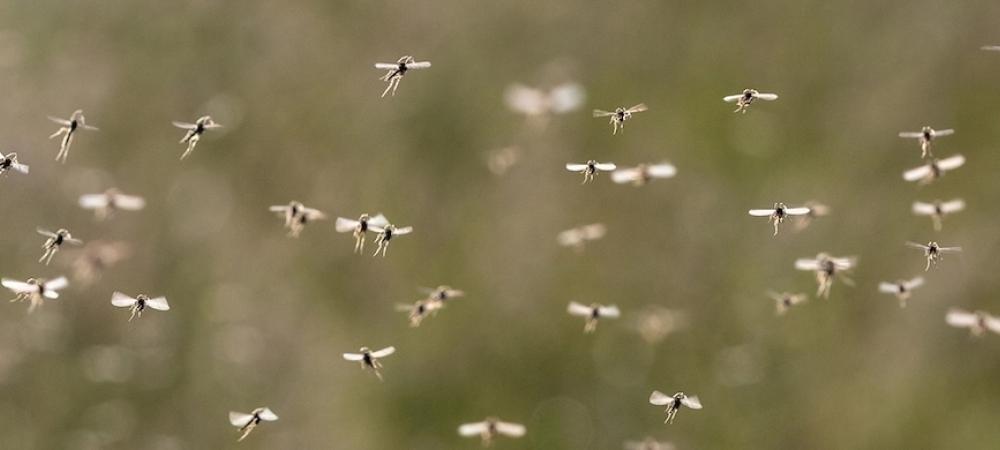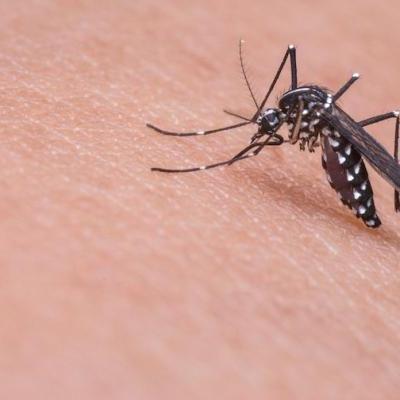Guide to Avoiding Mosquitoes in Illinois


Types of Mosquitoes in IL
Mosquitoes are a small, fly-like insect that feeds on blood of their host. Active during the warmer months, mature adults fly around until they find a host and start biting. Their bite is irritating and the loss of blood is minimal; however, the real concern with mosquitoes is the diseases they carry and transmit to their host.
There are several types of mosquitoes found in Illinois, including the house mosquito, tree-hole mosquito, and Asian Tiger mosquito. They vary in size, diseases they carry, and the time of day they bite.
Where do you find mosquitoes?
Female mosquitoes lay their eggs in standing or stagnant water. That’s why mosquitoes are usually found near marshes, ponds, and creeks. But since they can fly up to 20 miles from their original water source, you can find them most anywhere in Illinois. They are most frequent on still or slightly breezy days, anytime from dawn to dusk.
Why are mosquitoes dangerous?
While mosquitoes are most commonly known as a nuisance that can ruin any backyard party, they are one of the deadliest pests in the world. Malaria and other diseases carried by mosquitoes infect over 200 million people ever year, and claiming the lives of 2-3 million per year. While malaria is rare in the United States, in recent years, residents in Illinois have seen an increase in other serious mosquito-borne viruses.
1. West Nile Virus
Over the last 15+ years, West Nile virus has become a significant health concern for residents in Illinois. West Nile was first reported in 2001 in Illinois, and within a year had spread throughout the state. In 2002, there were more human cases and deaths of West Nile in IL than in any other state in the US. In recent years, the cases of West Nile disease have dropped in Illinois, concentrated in the northeastern counties of the state. It is transmitted to humans via infected mosquitoes, who would have picked up the virus from infected birds. There is no vaccination or specific treatments for West Nile.
Symptoms:
- Most infected people display no or mild symptoms.
- Fever and headache can affect some people.
- Some affected people, especially the elderly, can contract West Nile encephalitis, a serious brain disease. Symptoms include fever, headache, rash, conjunctivitis, rash, disorientation, and muscle weakness. Severe cases (less than 1%) can result in permanent brain damage, coma, and death.
2. Zika Virus
While the Zika virus is better known for outbreaks in South America and more tropical locations, there have been some cases of humans infected by Zika in Illinois. Zika primarily spreads through the bite of an infected mosquito, and it is only a matter of time before mosquitoes begin carrying Zika here in Illinois.
The Zika virus has been linked to microcephaly, a serious birth defect marked by poor brain development. This is why pregnant women or those looking to get pregnant must take special caution. There is no vaccine for Zika. While there is no treatment for Zika, you can treat the symptoms by drinking fluids, resting, and taking medicine to reduce pain and fever.
Symptoms:
- Most infected people display no or mild symptoms.
- Common symptoms include fever, rash, headache, red eyes, muscle pain, and joint pain.
- Symptoms can last up to a week
3. Additional Mosquito-borne Diseases
The St. Louis encephalitis and other forms of encephalitis virus are known to be carried by mosquitoes in Illinois. These diseases display similar symptoms, including fever, headache, disorientation, and tremors. It can cause spastic paralysis, coma, and death, especially in older populations.
How to Avoid Mosquitoes
Often, the best way to treat mosquitoes is to avoid their bites all together. Combined with removing their breeding locations and lawn treatments, you can create a safe space for you and your family to enjoy your backyard.
1. Wear Light Colored Clothes
Mosquitoes are attracted to darker colored clothing, so by wearing white or light-colored clothing, you are making yourself less of an appealing target for mosquitoes.
2. Use Insect Repellent
There are plenty of bug sprays and insect repellents you can apply to yourself and your family to avoid mosquito bites. Make sure you find a spray or lotion that contains one of the following active ingredients:
- DEET
- Picaridin
- IR3535
- 2-undercanone
- Oil of lemon eucalyptus (OLE) or para-methane-diol (PDM)
Be sure to follow the label on repellant for proper application techniques.
3. Remove Standing Water
As we saw above, mosquitoes use standing water as their ideal breeding ground. By removing stagnant water – and things that collect rainwater – you can prevent more mosquitoes from hatching in your backyard. This includes old tires, buckets, flower pots, clogged downspouts, and low spots in your yard. Ornamental ponds and water gardens, should use a circulating pump to keep water moving so mosquitoes can’t breed. Bird baths, wading pools, and outdoor fountains should be regularly flushed with water to keep it clean.
4. Yard Treatment Options
The best way to avoid mosquitoes in your backyard is to have a professional apply targeted treatments. Pest control professionals have specially-designed applications that target mosquitoes while being safe for your family. The can also offer additional tips and suggestions for making your yard mosquito-proof.
Looking for more Environmental Resources?
Want to learn more about caring for your yard and home in Illinois? Check out our online Resource Center for tips, techniques, and best practices for limiting your impact on the environment and keeping your family and plants healthy.

